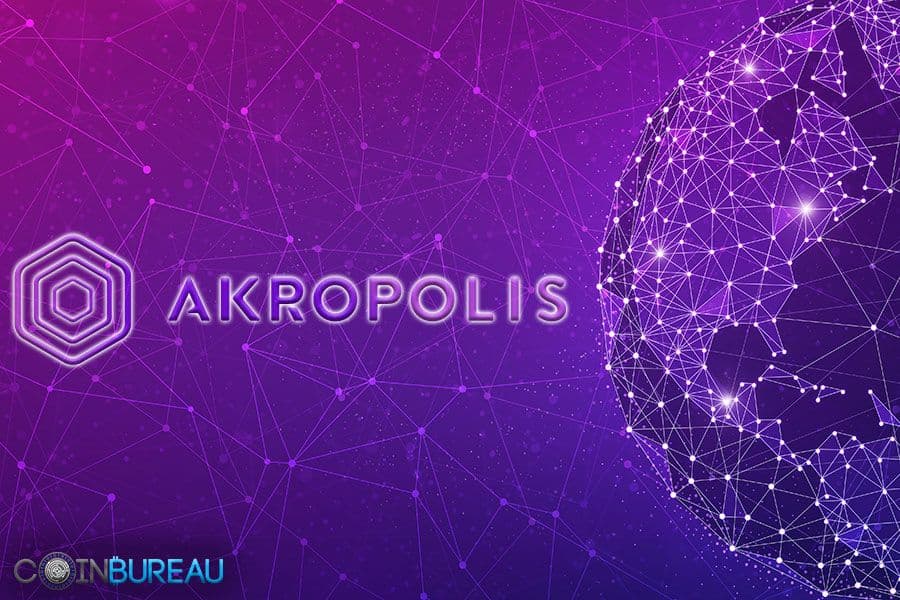Ankr is a project that has been getting quite a bit of attention lately. They are building a cloud computing platform that will distribute idle computing power.
Ankr truly believes that cloud computing is the future and they see a need for a decentralised alternative to the current monopolies of AWS, Azure and Google. However, they are not alone in their mission given the extent of similar blockchain based projects.
So, can they really compete in such as competitive space?
In this Ankr review, I will give you everything that you need to know about the project. I will also delve into the use cases and long term adoption potential of the ANKR tokens.
What is the Ankr Network?
The Ankr Network was created to provide a new blockchain solution that leverages the idle computing power from edge devices and data centers.
It’s distributed computing platform enables the sharing economy, where consumers will be able to access cloud resources far more affordably and enterprises will be able to monetize spare computing power.
The network is unique in that it is the first of its kind to use trusted hardware to ensure security at enterprise levels. It is also implementing plasma side-chains so that off-chain computing can be used to enhance the throughput and power of the network.
The goal of Ankr is to truly unlock the potential of distributed cloud computing by embedding computing power within the blockchain. This is achieved through the Proof of Useful Work (PoUW) consensus mechanism, where those who are securing the network and promoting block propagation are able to unlock significant computing resources.
Ankr is one of the novel approaches in the Distributed Cloud Computing blockchain space, and with the launch of its mainnet on July 10, 2019, the team feels they are well-positioned to take on any competition. In terms of market capitalization, Ankr does lag significantly behind Golem (GNT), but it is approaching the market cap of iExec RLC and is far more valuable than the SONM project.
It’s true that the distributed cloud computing space is getting crowded, there is still room for the unique methodology being applied by Ankr. The ever-growing size of available data and information calls for a secure data processing and storage platform, and Ankr looks to fill that role.
ANKR Details
The network model of Ankr offers great promise as it uses a traditional blockchain architecture, but improves on the consensus mechanism and incentive system.
The team took this approach to ensure the incentives for enterprise-level networks were strong enough, and that a unique set of actors would be attracted to the platform. By using Verification Nodes in the block validation process Ankr ensures the quality of the network is maintained, and that bad actors are removed.
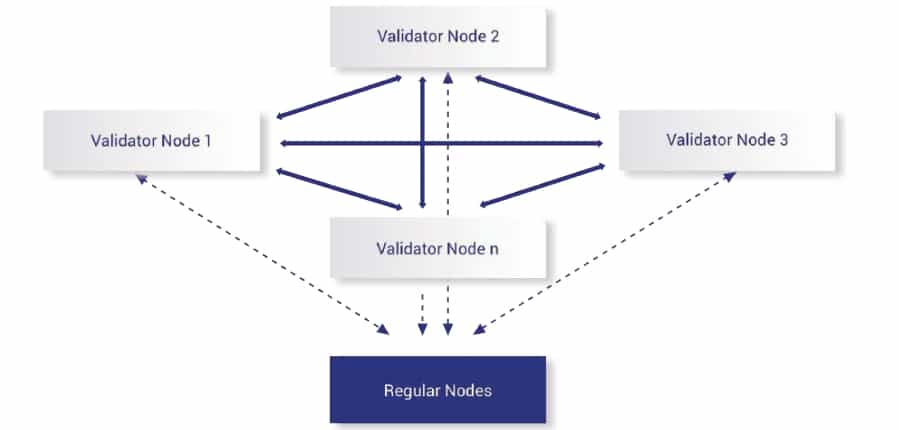 Ankr Blockchain Nodes. Image via Whitepaper
Ankr Blockchain Nodes. Image via WhitepaperIn order to ensure they have a system where only good actors are selected as Verification Nodes, Ankr employs a reputation-based system which filters actors based on node contributions. A Performance test is employed to fairly distribute among the actors with their differing computational resources.
Ankr is unique in employing the Intel SGX as the main technology component which allows for the execution of applications within the hardware itself. This technology is more secure against certain hardware and software attacks since it processes certain executions inside the hardware.
When it comes to the off-chain data and processing, there is a Native Oracle System (NOS) that transfers between the on-chain smart contracts and off-chain data. The NOS is secure and requires authentication to improve security.
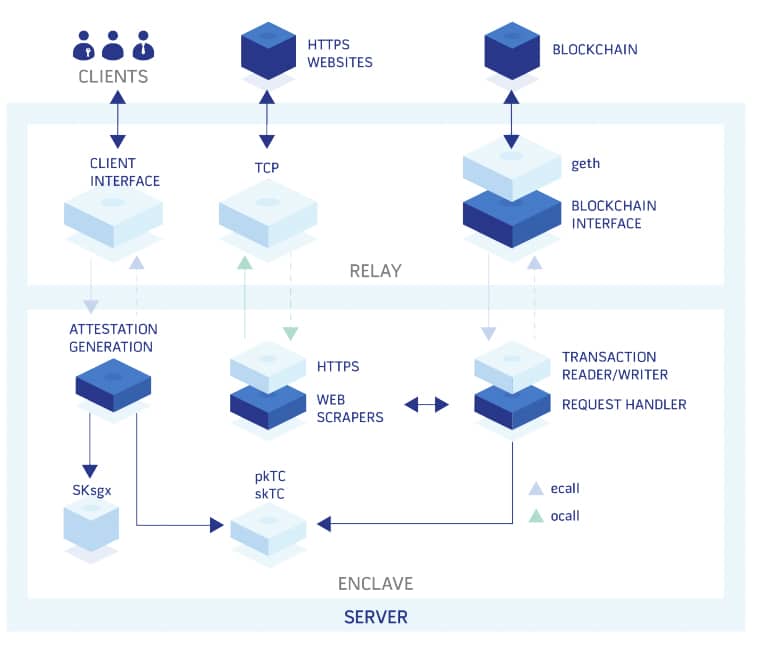 Ankr Native Oracle System Architecture. Image via Ankr Whitepaper
Ankr Native Oracle System Architecture. Image via Ankr WhitepaperData source security is also handled in a flexible manner since the platform supports all security levels from no encryption all the way to TLS 1.2/1.3 and Perfect Forward Secrecy (PFS).
The team understands that by using the Intel SGX technology they are entering a niche market by making their network dependant on a trusted hardware solution. Due to the expense of the hardware, it will necessarily limit the number of users able to support a Verification Node.
The Ankr team has chosen this path because they feel it will increase network security and increase the level of commitment from Node owners. This will not only lower the chance of actors joining the network with malicious intent, the team also feels it is necessary when considering the long-term evolution of the decentralized cloud computing ecosystem.
The ANKR Team
The Ankr core team is made up of 16 members, many of whom are graduates of the University of California at Berkeley. They have a strong background in engineering and technical disciplines, and some have limited marketing experience, with a few who have successfully created and sold other businesses before joining Ankr. There are also several partners and advisors to the project who provided commercial and entrepreneurial expertise to the project.
The Ankr team has many strong members, beginning with the founder, Chandler Song. He is a graduate of the University of California at Berkeley in Electrical Engineering and Computer Science. He serves as CEO of Ankr and has several years of experience working at Amazon prior to founding Ankr. He was an early adopter of Bitcoin and led development at the P2P real estate brokerage startup CitySpade in New York.
A second founding member of the Ankr Network is Stanley Wu, who spent ten years working at Amazon as a Technology Lead prior to helping found Ankr. He was one of the early engineers with Amazon Web Services, having joined in 2008, which gives him a deep knowledge of cloud computing.
 Some of the Ankr team members. Image via Ankr Website
Some of the Ankr team members. Image via Ankr WebsiteHe also worked as part of the Alexa Internet team and he is extremely knowledgeable about full-stack development, browser technologies, search engine technologies, and large-scale distributed systems.
Another key player at Ankr is Ryan Fang, another graduate of the University of California at Berkeley with degrees in Statistics and Business Administration. He is the COO at Ankr after gaining valuable experience as a data scientist at Credit Suisse and Morgan Stanley.
One other notable core team member is Song Liu, who is the Chief Security Engineer of Ankr. He graduated from Shanghai Jiao Tong University with a degree in Electrical Engineering, but is in his position at Ankr due to his experiences as an ethical hacker, working with companies such as Microsoft to uncover software flaws and bugs.
Prior to Ankr, he gained experience at Gigamon, a distributed security delivery platform, where he worked for 2 years. Prior to that he worked as a senior staff engineer at Palo Alto Networks, software architect at General Electric, a senior server engineer at Electronic Arts and has 10+ years experience as Senior Software Engineer and Tech Lead (LV6) at Amazon.
The ANKR Community
One thing Ankr does not have is a vibrant community to support the project. The Ankr sub-Reddit is incredibly small, with just 17 readers and 4 posts since it was created a year earlier. It doesn’t appear to be run by the official Ankr team.
That said, there is also a private sub-Reddit which is only accessible by invitation. That is possibly the official Reddit, but since it is private I have no idea how many readers there are, and I question how useful a private sub-Reddit is for the community.
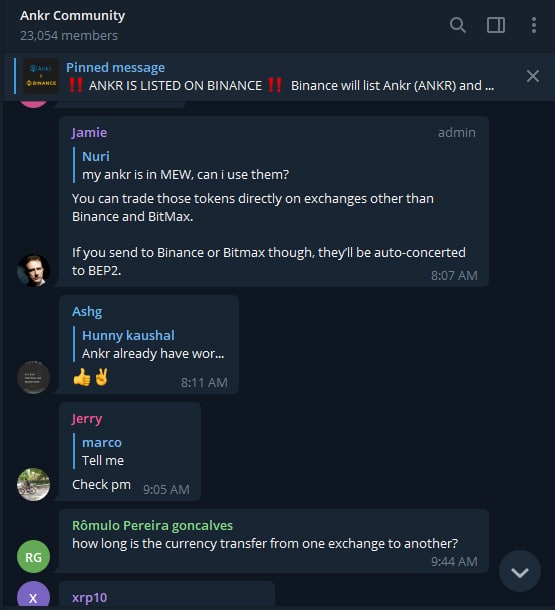 Screenshot of Ankr Telegram
Screenshot of Ankr TelegramOther social media sites show similarly small communities. There are 10,000 followers on Twitter and less than 100 subscribers to the YouTube channel. One area that is popular is the Telegram channel, where there are over 23,000 members.
The team also has a WeChat and KaKaoTalk channel, but I was unable to determine how large the communities there were. I suspect there is a lack of large scale interest from users due to the hardware requirements of becoming a node and profiting from securing the network.
The ANKR Token
Ankr held an ICO for their ANKR token back on September 16-22, 2018 during the depths of the crypto-winter. That didn’t stop the project from raising $18.7 million over the course of six days.
Most of that was raised in the private portion of the sale, with the public sale raising $2.75 million of the total. Tokens were sold at $0.0066 in the public sale and just $0.0033 each in the private sale. Only 3.5 billion of the 10 billion total tokens were offered for sale.
I was unable to locate price data prior to March 2019, at which time the ANKR token had already more than doubled from its ICO price to $0.013561. It continued higher throughout that month, hitting a high of $0.016989 on April 1, 2019.
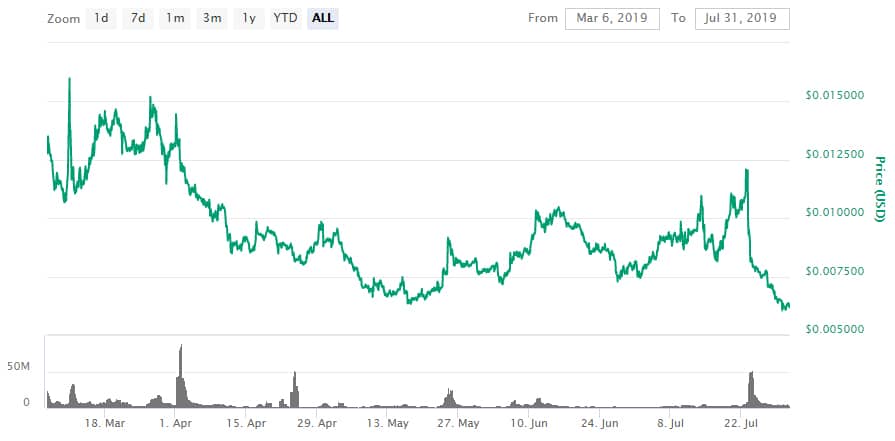 Ankr Price Performance. Image via CMC
Ankr Price Performance. Image via CMCIt fell quickly from that high and was at $0.10 within a week of hitting its all-time high. Since then it has remained volatile, trading between $0.06 and $0.013 in May, June and July 2019. As of July 31, 2019, it is near the bottom of that range at $0.006157 per ANKR.
With the launch of the mainnet on July 10, 2019, the Ankr team also released the native ANKR token. At the time there were also ERC-20 and BEP-2 ANKR tokens. Rather than requiring a token swap to the native token, the team made the decision to keep all three tokens active, so there is no need for holders to do any token swap.
The ERC-20 and BEP-2 tokens are used to provide liquidity and trading on exchanges, while the native ANKR token is required to access blockchain functions such as rewarding compute resource providers, payment for hosting and compute tasks, payment of network fees, and incentivizing stakeholders. The tokens are exchanged with each other across bridges, and there will never be more than 10 billion ANKR tokens across all three token types.
Buying & Storing ANKR
ANKR tokens are trading on over two dozen different exchanges, with the largest volume coming from Binance, although Upbit and BitMax also have a large amount of trading volume. Other possibilities include Hotbit, Bitinka, and Bittrex.
Taking a look at the turnover on these exchange books, they appear to be quite healthy and strong. This means that you have a decent amount of liquidity for your ANKR tokens and you are unlikely to have much slippage on large block orders.
 Register at Binance and Buy ANKR Tokens
Register at Binance and Buy ANKR TokensOnce you have bought your ANKR tokens you are probably going to want to take them off the exchange and keep them in an offline wallet. We are all too aware of the risks that come with large centralised exchange hacks.
For storing your ANKR the ERC-20 tokens can be stored in any ERC-compatible wallet, and the BEP-2 tokens can be stored in a BEP-2 compatible wallet. Or you can download the native ANKR wallet, which is included in the dashboard and is currently only available for Windows.
Ankr Development & Roadmap
Development progress can sometimes be hard to gauge as teams often embellish the amount that has been done on a project. However, you can get a great idea if you check out the coding activity in their public GitHub.
I decided to jump into the GitHub of Ankr to get a better sense of what was going on with the project. Below are the code commits for the top three most active pinned repositories.
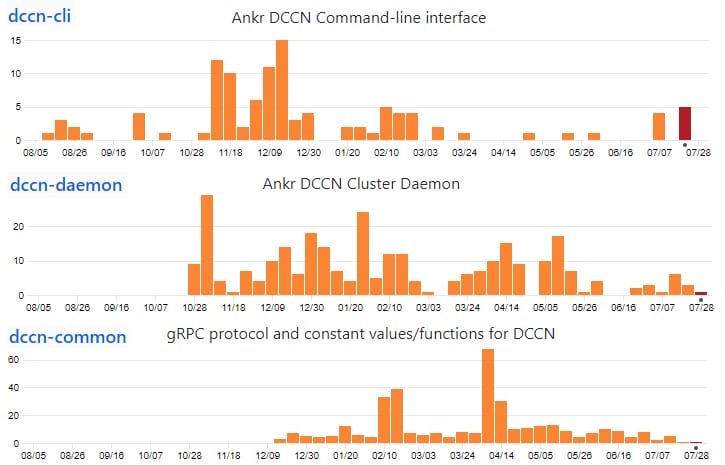 Code Commits on Select Repos over past 12 months
Code Commits on Select Repos over past 12 monthsAs you can see, the team has been pretty active with their code commits over the past 12 months. It is also worth pointing out that there are a further 21 other repos in their GitHub with varying degrees of activity.
This level of development activity is about in line with those that we see on other projects at similar stages. These updates make sense when viewed in the context of the previous milestones in their roadmap.
Looking ahead, the team has only got their roadmap out to the end of 2019. Below are the four milestones that they have laid out:
 Ankr Roadmap for 2019. Image via Anke
Ankr Roadmap for 2019. Image via AnkeIt would be interesting to see an updated Ankr roadmap that takes us well into 2020. If you wanted to keep up to date with the latest on their development progress then you can head on over to the Ankr official blog.
Conclusion
Ankr brings a new framework to the blockchain solution for distributed cloud computing. Its hardware-based solution does provide security benefits, but makes it expensive to become a node operator. Long-term this is expected to be good for the network.
Users of the cloud computing resources can take advantage of the cost-effective, secure solution through a user-friendly dashboard and investors can easily trade ANKR tokens without worrying about the liquidity of platform, thanks to the inclusion of three different token types.
The team is taking a very unique and interesting approach to cloud computing, and it seems promising, but very much a business-to-business offering.
Ankr definitely has a shot at disrupting the current cloud computing industry, however, they will need to find a way to market their product and draw in a large user base.
They do have several things going for them, including a youthful, talented team, and several important partnerships, not least of which is with the BOINC platform.


